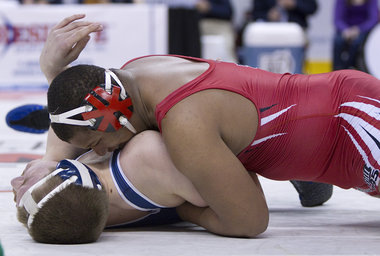 The biggest piece of news to emerge from the fall PIAA Board of Directors meeting Thursday night was the adoption of a new method of counting dual meets that go toward each wrestling team’s allotment of 22 regular season wrestling contests.
The biggest piece of news to emerge from the fall PIAA Board of Directors meeting Thursday night was the adoption of a new method of counting dual meets that go toward each wrestling team’s allotment of 22 regular season wrestling contests.
Effective July 1, 2012, every time one team wrestles against another, it will count as one team competition, regardless of whether this takes place as a regular dual, or part of a multiple team tournament.
This is a change from the previous rule, where in dual meet tournaments, each team could wrestle up to five others, but have the tournament count as only three points towards its allotment of 22.
“The wrestling steering committee saw that people were going to combination tournaments where they’d wrestle in pool play and then after that, go out into an individual bracket and wrestle a few more bouts there, and people were coming in with a high number of bouts,” PIAA Associate Executive Director Bob Lombardi said. “It was a health and safety concern with the number of bouts.”
On pace for a dip in field hockey injuries?
More than halfway through the first season of field hockey in which goggles have been mandated during games, Lombardi reports that the number of injuries reported is actually a little lower compared to this point last year.
The PIAA has received 10 injury reports from its game officials thus far. Only two have been directly attributed to the use of goggles on the field of play.
Lombardi also attributed the lower injury rate to the increase in the number of teams that now play on turf fields ” long grass and ill-kept fields often brought about more hacking before ” and the general increase in the players’ overall skill level.
In 2010, 46 total injuries were recorded during the field hockey season.
Another step taken toward 15-week football season and competitive cheer
The committee passed on a second-reading basis the proposal to trim the football season from 16 to 15 weeks, and to allow schools to use their second scrimmage date to play the first regular season game if they chose. This moves on to a third and final reading at the December board meeting. If it passes, it will become official. The same goes for competitive cheer, which will become a PIAA-sanctioned winter sport if it clears third reading in December.
On the horizon…
The fragile economy continues to influence policy making in high school sports. The PIAA examined, on a first reading basis, bylaw amendments that would allow school principals to accept donations to defray participation fees for student-athletes in need, without risking their eligibility or amateur status in any way. An amendment allowing schools to accept donations of equipment or product was also proposed.
Another proposal that passed on first reading basis was a requirement that foreign exchange students meet three provisions in the PIAA bylaws to be deemed eligible: age (under 19), health (pass the physical evaluation) and amateur status (they are deemed amateurs if they have never been paid for their athletic services in any sport). This comes after PIAA officials heard about an exchange student in another state who’d been paid to play basketball in Germany, but was now seeking eligibility for high school sports.









